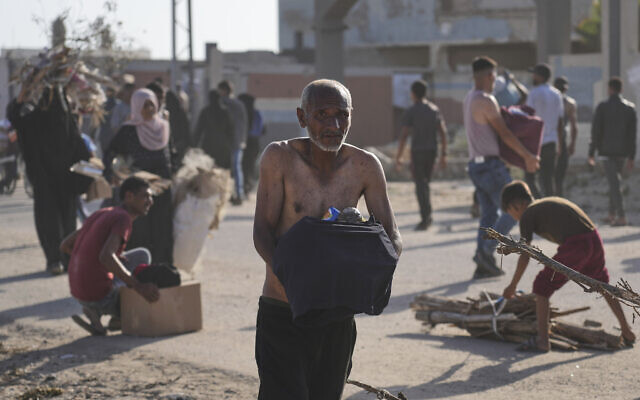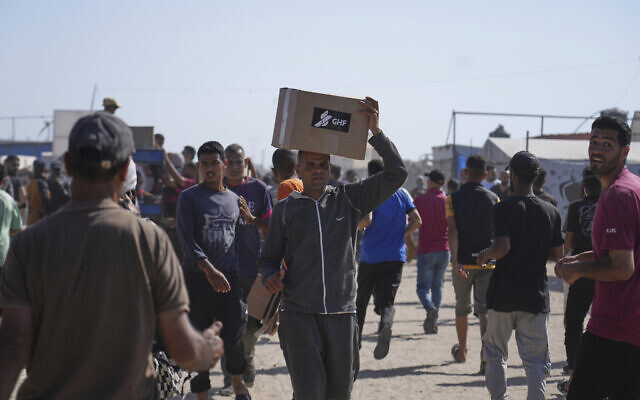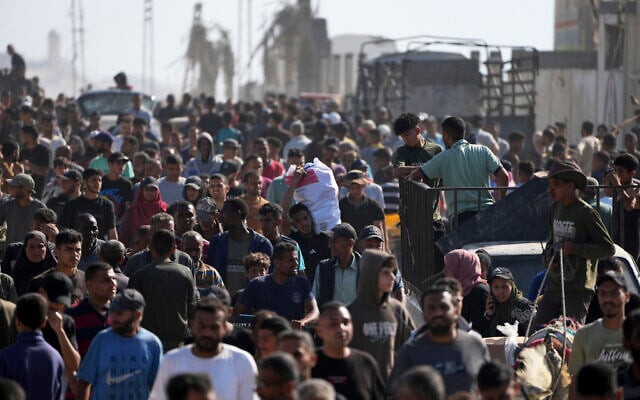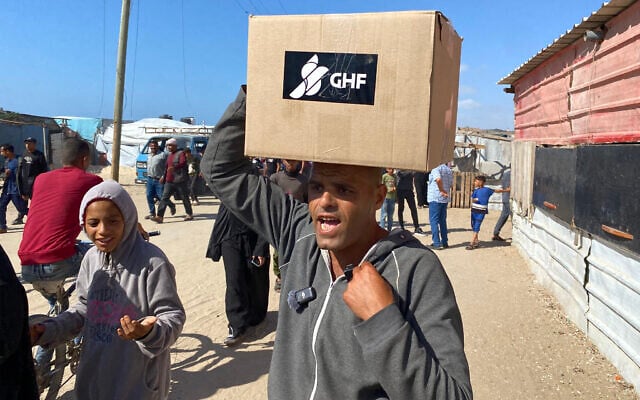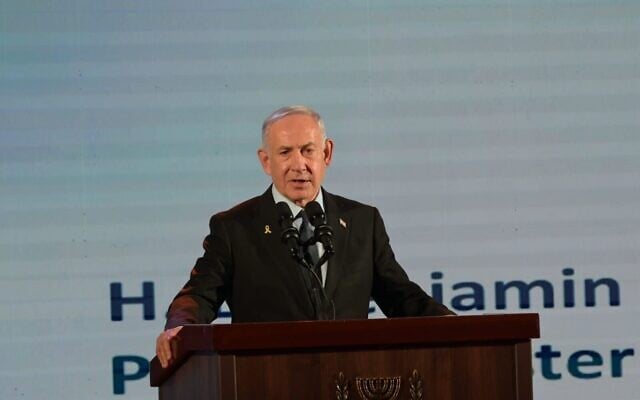


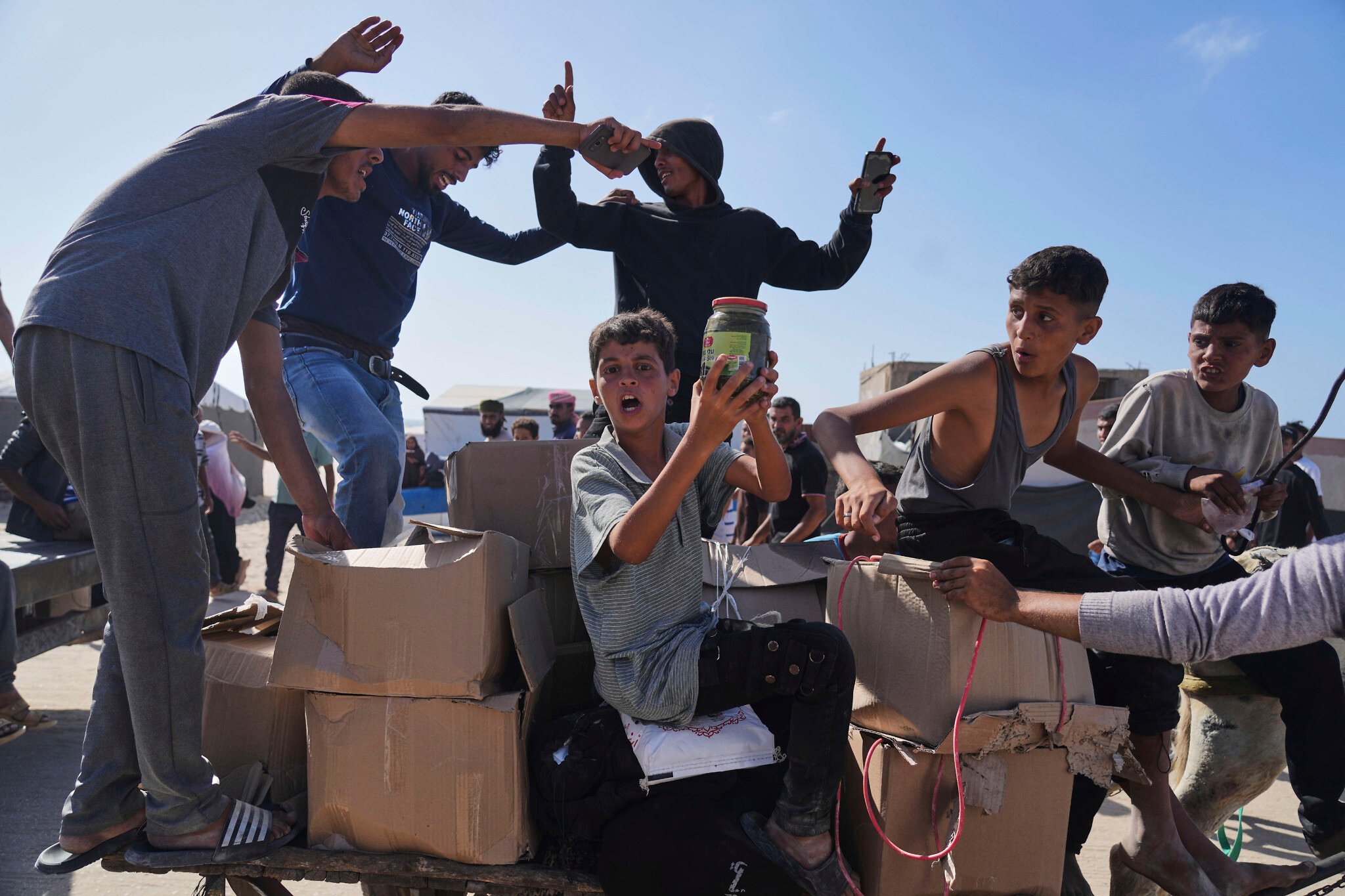
WASHINGTON — The Trump administration plans to renew its push for countries and international organizations to fund the Gaza Humanitarian Foundation once its new aid distribution initiative is proven successful, a US official told The Times of Israel on Tuesday.
The US official acknowledged that European countries and others the administration approached earlier this month about backing GHF before it began operating in the Gaza Strip did not respond “favorably.” The Times of Israel revealed that Trump aides threatened to cut funding to the World Food Program if it did not cooperate with the GHF.
“Countries are used to doing what they have always done,” the US official said on Tuesday.
However, the US official was unfazed by the initial negative response from countries, who have refrained from bankrolling GHF to date.
“The United States is a leader in innovation and once GHF works, others will want to share in its success,” the official added.
Asked about the overrun of one of GHF’s Rafah distribution sites by thousands of Palestinians earlier Tuesday — just the second day of GHF’s operations — the US official downplayed the incident, insisting that it lasted for about 20 minutes and that over 400,000 meals were fed as a result of the foundation’s work.
GHF itself described the looting similarly, explaining in a statement that its American security contractors managing the Rafah distribution site “fell back” to allow a “small number of Gazans take aid safely and dissipate” before operations were able to continue as normal.
Footage of the incident appeared far more chaotic, though, and nearby Israeli troops fired warning shots, sending people fleeing in panic after the looting was underway.
Israel blocked aid from entering Gaza for 78 days, arguing that enough had gone in during a six-week ceasefire, while also maintaining that Hamas was diverting much of the assistance.
Prime Minister Benjamin Netanyahu faced pressure from far-right coalition partners who had pushed for not allowing any aid into Gaza in order to pressure Hamas into releasing the remaining 58 hostages.
Jerusalem began to slightly ease its blockade last week, allowing several hundred trucks into Gaza, amid mounting international pressure and warnings from IDF officials that the Strip was on the brink of famine.
The scenes on Tuesday at the GHF distribution site appeared to further highlight the desperation of civilians who flocked toward Rafah in the thousands to try to secure food for their families.
Civilians were threatened by Hamas, which issued warnings against reaching GHF sites, claiming that Israel was using them to collect intelligence on them.
A senior Trump administration official said in a statement to reporters that Hamas had sought to “place blockades” on aid trucks, but these were overcome by GHF staffers. The Kan public broadcaster reported that Hamas also installed checkpoints to try to block Palestinians from reaching the GHF sites — a claim the terror group denied.
The Trump official hailed GHF’s work while blasting the UN for refusing to cooperate with the group’s new aid distribution initiative.
“Aid is getting to the people in need, and through their secure distribution system, Israel is kept safe and Hamas empty-handed,” said the senior administration official.
The official appeared to cite GHF’s figures, stating that roughly 8,000 boxes of food have been distributed in the foundation’s first two days of operation, with each box feeding 5.5 people for 3.5 days, totaling 462,000 meals.
GHF was established earlier this year in close coordination with Israeli officials who sought to advance a new method of aid distribution that could circumvent Hamas attempts at diversion.
But the UN and other international organizations have withheld much-needed backing for the GHF, arguing that its initiative violates humanitarian principles by requiring Gazans to walk long distances in order to receive heavy boxes of aid from a small number of distribution sites, likely leading to further displacement of Palestinians.
The length of Israel’s blockade also raised the chances for looting when food was finally allowed in, particularly when distributed from so few sites, aid organizations warned before Tuesday’s incident.
“The UN and other aid agencies were wrong to criticize,” the senior Trump administration official said, making no mention of the looting hours earlier. “These organizations echoed Hamas talking points rather than praising those who are delivering results.”
“GHF is a threat to Hamas’s longstanding system of looting the assistance intended for the people of Gaza,” the Trump official added.
Israel’s Coordinator of Government Activities in the Territories (COGAT) joined the criticism of the UN, claiming it was also failing collect humanitarian aid from the Gaza side of the Kerem Shalom border crossing.
According to COGAT, more than 400 truckloads of humanitarian aid, which were processed through Kerem Shalom and were awaiting collection and distribution on Tuesday.
“Israel has expanded the routes and aid, and extended the times of collection. Now it’s the UN’s turn to act accordingly with its obligation. We call on the UN to fulfill its mission entrusted to it as a key humanitarian partner as demanded and without any further delays,” a COGAT statement said.
“Unfortunately, the UN teams failed to arrive to collect and distribute the aid to Gazan civilians, despite the logistical and security adjustments conducted by IDF troops to coordinate the distribution of aid to civilians in the Gaza Strip,” it added.
A United Nations official in Gaza hit back at COGAT, telling The Times of Israel, “It is beyond cynical to blame humanitarian workers risking their lives in Gaza for not being able to do more.”
“The reality is that Israel is failing to enable our work and people are dying as a result,” the official said.
“For [almost] eighty days, Israel blocked every effort to bring lifesaving supplies into Gaza. Now, a trickle of aid is allowed in. But it is insufficient to lessen the desperation of a population that has been starved.”
“This means our trucks face the risk of being looted.”
“We are only permitted to deliver flour to bakeries [that] are not able to manage the overwhelming crowds of desperate people,” the UN official continued. “We try to reach the only open crossing point daily and to transport the goods safely, but we face dysfunctional coordination with troops on the ground, leaving us waiting for hours in a militarized zone for the green light to move, while bombing goes on.”
“When we are permitted to move, the routes we are provided with by Israeli forces are inappropriate and unsafe.”
“Our ability to deliver is only as strong as the access we’re given. During the ceasefire, it worked. It no longer does,” the official said.
Netanyahu hit back at critics of Israel’s policy on humanitarian aid, calling the US and Israeli-backed GHF a critical tool to weaken Hamas, while firmly rejecting accusations that Israel has used starvation as a weapon of war.
Addressing the looting incident during an English-language speech at the Foreign Ministry at an international summit on combating antisemitism, Netanyahu acknowledged, “There was some loss of control momentarily.”
“We’re going to put many more of these [distribution sites],” said the premier.
Last week, though, he said the ultimate plan was to limit the sites to a small area in southern Gaza guarded by the IDF, contradicting pledges by former GHF CEO Jake Wood to ensure aid is accessible to all parts of the Strip. Wood resigned from the post earlier this week, lamenting that Israeli restrictions violated “humanitarian principles of humanity, neutrality, impartiality and independence.”
Dismissing allegations that Israel is pursuing a deliberate policy of starving Gaza’s civilian population, Netanyahu called such claims “the current fad, the current lie” that “spreads like wildfire” in the media.
He declared there was no proof of malnutrition in the Gaza Strip, which he said could be seen in photographic evidence taken from IDF security inspections of detained civilians and combatants.
“You don’t see one, not one emaciated from the beginning of the war to the present,” Netanyahu said.
Fox News, one of US President Donald Trump’s favorite channels, aired a segment a day earlier showing an emaciated two-year-old girl who is currently hospitalized due to malnutrition.
Last week, CNN aired a segment on a Gazan infant who died after her mother was unable to breastfeed amid the limited food supply. Baby formula and other medicine had run out amid the blockade.
The West Bank-based Palestinian Authority health minister said last week that 29 children and elderly people have died from starvation-related deaths in Gaza in recent days and that many thousands more are at risk. Arabic media outlets have aired countless reports on the humanitarian crisis.
Netanyahu said Tuesday that the “best way” for Israel to combat what he said are false accusations about starving Gazans is “winning the war quickly.”
Already back in December 2023, though, the premier claimed that Israel was on the “verge of victory.”
While Trump is increasingly speaking of his desire to quickly and permanently end the conflict in Gaza, Netanyahu has vowed to continue the war until Israel dismantles Hamas’s military and governing capabilities, frees the hostages, demilitarizes Gaza, exiles Hamas’s leaders and implements Trump’s plan to relocate Gazans.
Proponents of a ceasefire have argued that Israel has already maximized its military gains against Hamas, and that the IDF is currently fighting an insurgency that will endure in Gaza, as long as Netanyahu refuses to stand up a viable Palestinian alternative to Hamas rule. Arab countries have pushed for the Palestinian Authority to return to Gaza and have offered to assist in the post-war management of the Strip if invited by the PA, but Netanyahu has refused, likening the authority to Hamas.
The prime minister also faces threats from coalition partners who have threatened to collapse the government if he agrees to a ceasefire in exchange for the release of the hostages. A Channel 12 poll from last week found that a majority of Israelis believe he is more interested in remaining in power than freeing the hostages or defeating Hamas.

